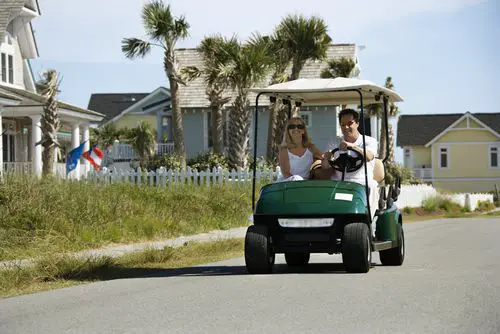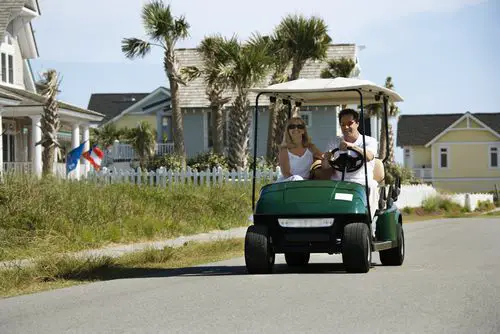North Carolina Golf Cart Laws

Golf carts have become a popular mode of transportation and recreation in North Carolina, offering a convenient and eco-friendly way to navigate various areas. However, to ensure safe and responsible usage, it is essential to understand and adhere to the specific laws and regulations governing golf carts in the state. Whether you own a golf cart, plan to rent one, or simply want to be well-informed about the regulations, this comprehensive guide on North Carolina Golf Cart Laws is here to help.
In this guide, we will explore the intricacies of North Carolina’s golf cart laws, providing you with a thorough understanding of where you can drive a golf cart, registration and permit requirements, safety regulations, operating on public roads, insurance considerations, DUI regulations, and essential safety tips. By familiarizing yourself with these laws, you will be equipped with the knowledge needed to navigate the road to safe and legal golf cart operation in North Carolina.
So, whether you’re planning a leisurely ride through a golf course, exploring private communities, or looking to use your golf cart on public roads, let’s dive into the details of North Carolina’s golf cart laws and ensure a smooth and compliant journey.

Exploring North Carolina: Where Can You Drive a Golf Cart?
North Carolina offers various areas where golf cart operation is permitted. It’s essential to understand the designated locations to ensure you’re driving within legal boundaries. Let’s explore where you can legally drive a golf cart in North Carolina:
Golf Courses and Private Communities
Golf courses and private communities often allow golf cart usage within their premises. These areas have established rules and regulations specific to golf cart operation. Golfers and residents can conveniently travel between holes, clubhouses, and amenities using their golf carts.
Public Roads and Streets
North Carolina law allows for golf carts to be driven on certain public roads and streets. However, it’s important to note that not all roads are open to golf cart traffic. Municipalities may have their own ordinances and restrictions regarding golf cart usage on public roads. It’s crucial to research and understand the specific regulations that apply to the area where you wish to drive your golf cart.
Golf Cart Registration and Permit Requirements
To legally operate a golf cart in North Carolina, you may need to register it and obtain a permit. Let’s explore the registration and permit requirements for golf carts:
Do you need to register your golf cart in North Carolina?
In North Carolina, golf carts are classified as “low-speed vehicles” (LSVs) or “personal transportation vehicles” (PTVs) under state law. These classifications determine whether registration is necessary for your golf cart.
LSVs and PTVs operated on public roads require registration, while those used exclusively on private property may not need to be registered. It’s essential to understand the specific usage scenarios and consult local authorities or the North Carolina Division of Motor Vehicles (DMV) to determine if registration is required for your golf cart.
Obtaining a golf cart permit
To register your golf cart in North Carolina, you’ll need to visit your local DMV office and provide the necessary documentation. The requirements may include proof of ownership, proof of insurance, and payment of registration fees. The DMV can provide specific information on the required documents and fees based on your circumstances.
Safety Regulations and Equipment Requirements
Safety is of utmost importance when operating a golf cart in North Carolina. Adhering to safety regulations and ensuring that your golf cart meets the required equipment standards is crucial for the well-being of both the operator and other road users. Let’s explore the safety regulations and equipment requirements in detail:
What safety regulations must golf cart owners adhere to?
Golf cart owners in North Carolina must comply with several safety regulations to promote responsible and safe operation of golf carts. These regulations are in place to prevent accidents, minimize risks, and ensure the safety of all individuals on the road. Some of the key safety regulations include:
- Minimum Age Requirements: North Carolina law sets a minimum age requirement for operating a golf cart on public roads. It’s important to verify the specific age restrictions as defined by local ordinances and jurisdictions.
- Driver’s License: In some cases, a valid driver’s license may be required to operate a golf cart on public roads. The type of license needed can depend on factors such as the classification of the road and the speed capabilities of the golf cart. It’s crucial to understand the specific licensing requirements based on your situation.
- Seat Belts and Occupant Restraints: Golf carts equipped with seat belts or other occupant restraint systems must ensure that all occupants utilize them while the vehicle is in motion. Proper use of seat belts is essential for the safety of individuals in the event of a collision or sudden stop.
- Lighting and Signaling Devices: Golf carts operating on public roads must be equipped with proper lighting and signaling devices. These include headlights, taillights, turn signals, and reflectors to enhance visibility and ensure that other road users can anticipate the golf cart’s movements.
- Mirrors and Reflective Devices: Golf carts should be equipped with rearview mirrors and reflective devices to provide the operator with a clear view of the surrounding traffic. Reflective devices also improve the visibility of the golf cart to other drivers, especially during low-light conditions.
Speed Limitations and Restrictions
Golf carts in North Carolina are designed for lower speeds compared to regular vehicles. It’s important to adhere to the speed limitations imposed by local regulations and exercise caution when operating a golf cart. The specific speed limits may vary depending on the classification of the road, so it’s essential to familiarize yourself with the posted limits in the areas where you intend to drive your golf cart.
Additionally, certain roads or areas may have specific restrictions on golf cart usage, such as limiting access to certain lanes or prohibiting golf carts from higher-speed roadways. Always pay attention to signage and respect any restrictions that may be in place.
Operating a Golf Cart on Public Roads
Operating a golf cart on public roads in North Carolina comes with specific rules and restrictions. Understanding and complying with these regulations is essential to ensure the safety of both the golf cart operator and other road users. Let’s delve into the key considerations when driving a golf cart on public roads:
Can you legally drive a golf cart on public roads in North Carolina?
North Carolina law permits the operation of golf carts on certain public roads, but it’s important to note that not all roads are open to golf cart traffic. The permissibility of golf carts on public roads depends on local ordinances and regulations. It’s essential to research and understand the specific rules that apply to the area where you plan to drive your golf cart.
Understanding the rules and restrictions for road usage
When operating a golf cart on public roads, it’s crucial to follow the same rules and regulations that apply to other motor vehicles. Here are some important considerations:
- Maximum Speed Limits and Traffic Regulations: Golf carts must adhere to posted speed limits and all other traffic regulations, including traffic signals, stop signs, and yielding right-of-way. It’s crucial to drive at a safe and appropriate speed for the given roadway and traffic conditions.
- Crossing Intersections and Yielding to Other Vehicles: When crossing intersections, golf cart operators must exercise caution and yield the right-of-way to other vehicles as required. It’s important to ensure that other drivers have sufficient time to react and that the golf cart operator can safely complete the maneuver.
- Parking and Designated Areas of Operation: Golf carts should only be parked in designated areas and should not obstruct traffic flow or pedestrian pathways. It’s important to follow parking regulations and avoid creating hazards for other road users.
Golf Cart Insurance Requirements
Insurance considerations are an important aspect of golf cart ownership in North Carolina. Let’s explore the insurance requirements for golf carts operating in the state:
Is insurance mandatory for golf carts in North Carolina?
While insurance requirements for golf carts may vary depending on the specific circumstances, it is generally recommended to have insurance coverage for your golf cart. Some factors that can influence the need for insurance include whether you operate your golf cart on public roads and if it is registered as an LSV or PTV.
Liability insurance provides protection in the event of property damage or bodily injury caused by the golf cart. It is wise to consult with an insurance provider to understand the coverage options and requirements based on your particular situation.
DUI Regulations for Golf Cart Operators
Operating a golf cart while under the influence of alcohol or drugs is not only dangerous but also illegal in North Carolina. It’s important to understand the DUI regulations specific to golf cart operation:
Can you operate a golf cart while under the influence of alcohol or drugs?
North Carolina law prohibits operating a golf cart while under the influence of alcohol or drugs. The legal blood alcohol concentration (BAC) limit for operating a golf cart is the same as that for operating a motor vehicle, which is 0.08%. Violating this regulation can result in severe penalties, including fines, license suspension, and even imprisonment.
It is crucial to prioritize safety and make responsible choices when operating a golf cart. If you plan to consume alcohol or drugs, it’s advisable to arrange alternative transportation or designate a sober driver to operate the golf cart.
Golf Cart Safety Tips and Best Practices
Operating a golf cart safely requires adherence to specific guidelines and best practices. Here are some essential tips to ensure a safe and enjoyable golf cart experience:
- Observe Speed Limits and Maintain a Safe Distance: Adhere to the posted speed limits and always drive at a safe and reasonable speed for the given conditions. Maintain a safe distance from other vehicles, allowing for ample reaction time.
- Yield to Pedestrians and Other Vehicles: Respect the right-of-way of pedestrians, bicyclists, and other vehicles. Yield when necessary and exercise caution when navigating intersections or shared pathways.
- Regular Maintenance and Inspections: Keep your golf cart in proper working condition by performing regular maintenance and inspections. Check the brakes, tires, lights, and other essential components to ensure they are functioning correctly. Address any issues promptly and seek professional assistance if needed.
- Stay Alert and Focused: Avoid distractions while operating a golf cart. Stay alert, keep both hands on the steering wheel, and maintain full attention on the road ahead.
- Be Mindful of Weather Conditions: Adjust your driving behavior according to the weather conditions. Reduce speed and increase caution when encountering rain, fog, or other adverse weather conditions that may impact visibility and traction.
By following these safety tips and best practices, you can enjoy a safe and pleasant golf cart experience in North Carolina.
Future Updates and Changes to Golf Cart Laws
Golf cart laws and regulations are subject to updates and changes over time. It’s important to stay informed about any potential amendments that may affect golf cart operation in North Carolina. Monitor legislative developments and updates from local authorities to ensure compliance with the most current regulations.
Conclusion
Understanding and adhering to the golf cart laws in North Carolina is essential for safe and legal operation. Whether you’re a golf cart owner, a visitor to the state, or simply interested in the regulations, this comprehensive guide has provided you with the necessary information to navigate the road to safe and legal golf cart operation in North Carolina. By following the guidelines, being aware of the designated areas for golf cart usage, registering your golf cart if required, complying with safety regulations and equipment requirements, understanding the rules for operating on public roads, considering insurance coverage, abstaining from driving under the influence, and following safety tips and best practices, you can ensure a safe and enjoyable golf cart experience in North Carolina.
Remember to stay updated with any future changes or updates to the golf cart laws in the state, as regulations may evolve over time. By staying informed and adapting to any new requirements, you can continue to operate your golf cart in a lawful and responsible manner.
Always prioritize the safety of yourself, your passengers, and other road users. By being a responsible golf cart operator, you can contribute to the overall safety and enjoyment of everyone sharing the roads and pathways in North Carolina.
With a clear understanding of the golf cart laws and a commitment to safe and legal operation, you can embark on your golf cart adventures in North Carolina with confidence and peace of mind. Enjoy the beautiful landscapes, golf courses, and communities as you navigate the roads in compliance with the regulations set forth by the state.






